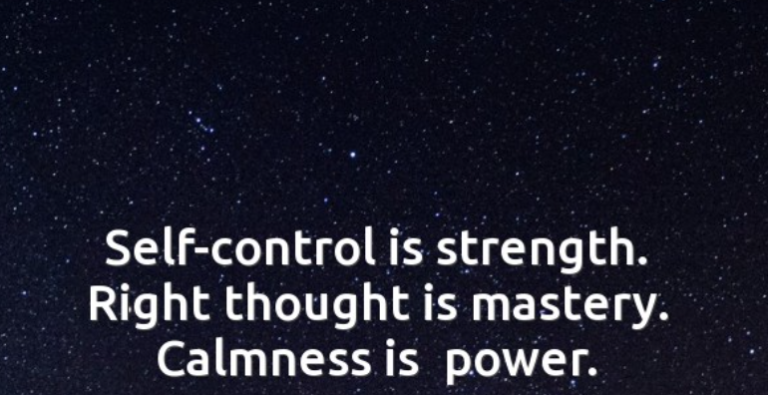Self-control is a vital trait that empowers individuals to navigate life’s challenges with poise and resilience. As Aristotle once said, “I count him braver who overcomes his desires than him who conquers his enemies; for the hardest victory is over self.” This article explores the profound impact of self-control, elucidating why self control is strength and how calmness, an art of mastery, intertwines with it to create a fulfilling and balanced life.
Understanding Self-Control
Self-control is the ability to regulate one’s emotions, thoughts, and behaviors in the face of temptations and impulses. It is the mental muscle that allows us to delay gratification and make rational decisions, often in contrast to immediate desires. The psychological basis of self control lies in the prefrontal cortex, the brain region responsible for planning, decision-making, and moderating social behavior.
The Strength of Self-Control
Self-control contributes to personal strength in numerous ways. Firstly, it enhances our decision-making abilities. Individuals with high self control are more likely to make choices that align with their long-term goals rather than succumbing to short-term temptations. For instance, a student who prioritizes studying over partying is exercising self-control to achieve academic success.
Secondly, self control fosters better relationships. By managing impulses and emotions, individuals can respond more thoughtfully in interactions, reducing conflicts and building trust. For example, a person who remains calm and listens during a disagreement, rather than reacting angrily, is likely to maintain healthier relationships.
Lastly, self-control significantly improves emotional regulation. It enables individuals to manage stress, anxiety, and frustration more effectively. People who exhibit self control can navigate life’s ups and downs with greater ease, maintaining their mental well-being even in challenging situations.
The Art of Calmness
Calmness is the state of being free from agitation, excitement, or disturbance. It is closely linked to self-control, as maintaining calm often requires regulating one’s emotional responses. The relationship between self control and calmness is symbiotic; self control helps achieve calmness, and being calm enhances one’s ability to exercise self control.
The psychological benefits of staying calm are profound. Calmness reduces the physiological responses to stress, such as increased heart rate and blood pressure, promoting overall health. It also improves cognitive functions, enabling clearer thinking and better problem-solving. In stressful situations, a calm demeanor can be a powerful asset, allowing individuals to assess situations objectively and make rational decisions.
Advantages of Self-Control and Calmness
The advantages of self-control and calmness extend across various aspects of life:
- Improved Mental Health: Self-control and calmness contribute to reduced anxiety and stress, fostering better mental health. They enable individuals to develop effective coping mechanisms, making them less susceptible to mental health issues.
- Enhanced Productivity and Focus: By prioritizing long-term goals over immediate gratification, individuals can stay focused and productive. Self control helps in avoiding distractions and procrastination, leading to more efficient work habits.
- Strengthened Resilience and Adaptability: Self-controlled and calm individuals are better equipped to handle setbacks and adapt to changes. They can recover from failures more quickly and remain steadfast in the pursuit of their goals.
How to Develop Self-Control and Calmness
Developing self control and calmness requires deliberate practice and consistency. Here are some practical techniques:
- Mindfulness and Meditation: Mindfulness practices, such as meditation, help increase awareness of thoughts and emotions, making it easier to manage them. Regular meditation can strengthen the prefrontal cortex, enhancing self control.
- Setting Clear Goals and Priorities: Establishing specific, measurable goals helps direct efforts and resources towards what truly matters. Prioritizing tasks based on their importance and deadlines can prevent impulsive decisions.
- Practicing Delayed Gratification: Training oneself to delay gratification can improve self-control. This can be done through simple exercises, like waiting a few minutes before eating a treat or saving money instead of making an impulsive purchase.
To maintain calmness:
- Breathing Exercises: Deep breathing techniques can quickly reduce stress and promote relaxation. Practicing these exercises regularly can help maintain calmness in stressful situations.
- Visualization Techniques: Visualizing peaceful and positive scenarios can help manage anxiety and maintain a calm state of mind. This technique is often used by athletes and performers to stay focused and composed.
- Regular Physical Activity: Exercise is a powerful tool for managing stress and anxiety. Endorphins are released when you exercise, and these chemicals elevate mood and enhance wellbeing.
A supportive environment also plays a crucial role in fostering self-control and calmness. Surrounding oneself with positive influences, seeking guidance from mentors, and building a network of supportive friends and family can significantly enhance these traits.
Overcoming Challenges
Despite the benefits, developing self-control and calmness can be challenging. Common obstacles include stress, fatigue, and a lack of motivation. Here are strategies to overcome these challenges:
- Stress Management: Identifying stressors and developing healthy coping mechanisms, such as exercise, hobbies, or talking to a friend, can mitigate the impact of stress on self-control.
- Adequate Rest: Ensuring sufficient sleep and rest is crucial for maintaining self-control. Fatigue can impair decision-making and increase impulsivity.
- Consistent Practice: Like any skill, self-control and calmness improve with practice. Regularly engaging in activities that require self-discipline and composure can strengthen these abilities over time.
Conclusion
Self-control is strength that provides a foundation for personal growth and success. The art of calmness, intertwined with self-control, enhances our ability to navigate life’s challenges with grace and resilience. By understanding the importance of these traits and actively working to develop them, individuals can improve their mental and physical health, strengthen relationships, and achieve their long-term goals. Embracing self-control and calmness in daily life is not just a path to personal mastery but a journey towards a more fulfilling and balanced existence.




Стильные советы по выбору превосходных образов на любой день.
Статьи профессионалов, новости, все показы и шоу.
https://www.addonface.com/read-blog/83288